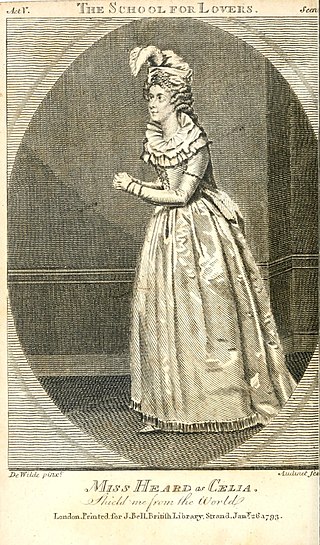
Colley Cibber was an English actor-manager, playwright and Poet Laureate. His colourful memoir An Apology for the Life of Colley Cibber (1740) describes his life in a personal, anecdotal and even rambling style. He wrote 25 plays for his own company at Drury Lane, half of which were adapted from various sources, which led Robert Lowe and Alexander Pope, among others, to criticise his "miserable mutilation" of "crucified Molière [and] hapless Shakespeare".
This article contains information about the literary events and publications of 1743.

Anne Oldfield was an English actress and one of the highest paid actresses of her time.

Edward Kynaston was an English actor, one of the last Restoration "boy players", young male actors who played women's roles.

The Tragical History Of King Richard Iii, Alter'd From Shakespeare (1699) is a history play written by Colley Cibber. It is based on William Shakespeare's Richard III, but reworked for Williamite audiences.

The Spartan Dame is a 1719 tragedy by the Irish writer Thomas Southerne. It was inspired by a story from Plutarch's Life of Aegis and was originally written as early 1687, but faced a long period of censorship and revision. The Drury Lane managers chose to revive it at a time of tension with the Stanhope-led government Whigs over licensing issues, and may have selected it because its plot subtly allowed them to demonstrate sympathy with the opposition Whigs led by Robert Walpole following the recent Whig Split.
Caesar in Egypt is a 1724 tragedy by the British writer Colley Cibber. It is inspired by Pierre Corneille's 1642 French play The Death of Pompey about Julius Caesar's intervention in the Egyptian Civil War between Cleopatra and her brother. Cibber also incorporated elements of Plutarch and John Fletcher's The False One. The Drury Lane company invested lots of resources to make it a particularly extravagant production in the traditional style of a Restoration heroic drama.
The Christian Hero is a 1735 tragedy by the British writer George Lillo. It is based on the life of Skanderbeg who led a rebellion against the Ottoman Empire in the fifteenth century. Two years earlier William Havard had written Scanderbeg, another work based on his life.

The Provoked Husband is a 1728 comedy play by the British writer and actor Colley Cibber, based on a fragment of play written by John Vanbrugh. It is also known by the longer title The Provok'd Husband: or, a Journey to London.
Art and Nature is a 1738 comedy play by the British writer James Miller. The play received a rough reception from what Miller described a "faction" in the Drury Lane audience, and its run was not extended beyond a single night. He described its subsequent publication as an attempt to vindicate himself.
The Coffee House is a 1738 comedy play by the British writer James Miller, written as an afterpiece. After being performed at Drury Lane, it was published later that year with some alterations to the play's original text.
The Mother-in-Law is a 1734 comedy play by the British writer James Miller. Also known by the longer title The Mother-in-Law, or the Doctor the Disease it debuted at the Haymarket Theatre in London.
Agamemnon is a 1738 tragedy by the British writer James Thomson. It is based on the story of Agamemnon from Greek Mythology.

The School for Lovers is a 1762 comedy play by the British writer William Whitehead.
The Foundling is a 1748 comedy by the British writer Edward Moore.
The Triumphs of Love and Honour is a 1731 tragedy by the British writer Thomas Cooke.
The Non-Juror is a 1717 comedy play by the British writer Colley Cibber. It is inspired by Molière's 1664 work Tartuffe.

The Double Gallant is a 1707 comedy play by the British writer Colley Cibber.

The Rival Fools is a 1709 comedy play by the British writer Colley Cibber. It drew inspiration from the earlier play Wit at Several Weapons. Despite Cibber's previous record of turning out hits, it was not a great success.

The Carless Husband is a comedy play by the English writer Colley Cibber. It premiered at the Theatre Royal, Drury Lane on 7 December 1704. The original cast featured Cibber as Lord Foppington, George Powell as Lord Morelove, Robert Wilks as Sir Charles Easy, Anne Oldfield as Lady Betty Modish, Frances Maria Knight as Lady Easy, Henrietta Moore as Lady Graveairs and Jane Lucas as Mrs Edging. It has been described as Cibber's most successful play, and provided a vehicle for his popular foppish Lord Foppington personae.











